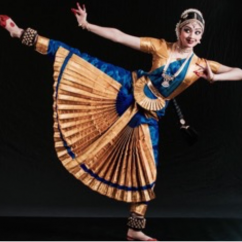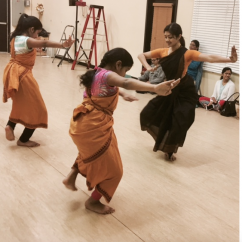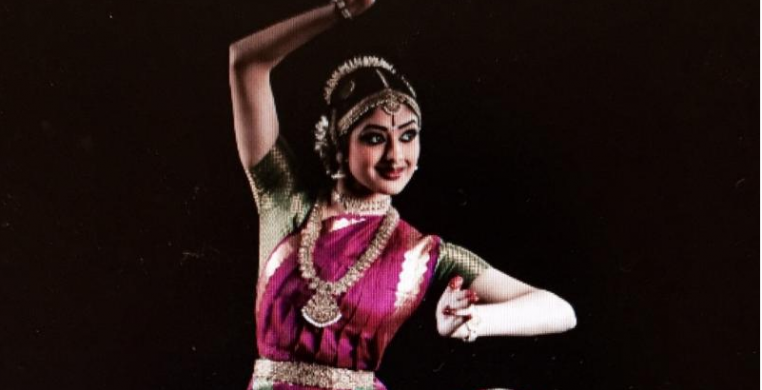 Rekha Iyer
Dancing In A Daze
Rekha Iyer
Dancing In A Daze
Everything in my body seemed uncompromisingly rigid. As I shifted my weight back to center from a lunged position on the ground, my gaze moved towards a patch of yellow light that had drifted upstage, now at the center mark of the studio. Its intensity poured into the room, more noticeably now. Seeping through the small cracks in the blinds from the window up above, with an unrelenting desire to consume, it penetrated the space in fragmented bright bursts. In that presence of severe light, I was stripped of my sense of space and orientation, and I was left without a center. I entered a space of weightlessness as I closed my eyes, and then an all too familiar throbbing enveloped the crown of my head. I stood there in the center of the floor, overwhelmed by the pounding light, left in a daze, clutching my head in my hands.
For the next 8 months after my fall, I listened to my doctors and therapists, all of whom told me that in order to recover most effectively, I needed to stop dancing. There was no question about this. Upon my resistance, I was met with disappointing responses: “Your brain needs to heal. You have a traumatic brain injury Rekha, and you need to rest.”
Resting however seemed to have a stagnating effect on my recovery. Within a month, I was unable to attend school, unable to read for longer than a couple of minutes, and unable to dance. Even with an abbreviated academic schedule, the overstimulation of classroom conversation and bustling passing periods would send me home early almost everyday. I would come home with the need to sleep for hours, but still be unable to complete any of my coursework or practice my dance routines. Often, I would find myself straining my eyes just to read for a few minutes, but somehow not be able to see the text as individual words or phrases, but only as an overwhelming page. I experienced frustration like no other with every attempt I made to learn.
As I continued to struggle with cognitive fatigue, dizziness, and convergence insufficiency, the medical professionals decided on a more active approach with my rehabilitation. In an effort to retrain my eyes to read again, I would religiously practice scanning a string of words across a page with horizontal saccades. The therapy did little for my cognition, my memory, or my balance. Without any other known alternatives, I immersed myself entirely in my rehabilitation, with a single motivation: to be able to get back to dancing again. Rekha in "The Incomplete Gesture"
Rekha in "The Incomplete Gesture"
I could not stay away from dance entirely though; it was impossible for me to remove myself from the only way of life I had ever known. I am forever grateful for the unfading support and encouragement I received from my dance instructor, Ms. Hema Rajagopalan, as she allowed me to keep in touch with my art as much as I possibly could, given my condition. I was never made to feel marginalized, and I am blessed for that; it often happens that mentors lose faith in, or simply forget about those students or athletes who have suffered a serious injury. My dance teacher went out of her way to provide me with countless creative opportunities to involve myself in dance through the avenues of teaching and backstage management. Even though I was not back dancing myself, she gifted me with experiences for which I remain indebted to her. Rekha and Hema
Rekha and Hema
All throughout my young life, I had fallen back on the power of movement that dance had always offered to me, to cope with the tragedy and loss I had experienced in my life. In this devastating event of a traumatic brain injury however, my health itself hindered me from dealing with the emotional distress that resulted from my injury. The unprecedented social consequences of a brain injury were grievous, as the stigma associated with it alienated me from my high school life even further. I lost people in my life that I thought I would never lose as a result of their inability to understand what I was going through. This truly traumatic experience left me feeling helpless, without a way of expression, in dealing with my frustrations of not recovering. At the age of sixteen, I had found myself at my lowest point in life, a period that should have been one of the most exciting years for a young girl. Rekha Teaching younger Dancers
Rekha Teaching younger Dancers
In this time of immense disappointment, I did come to one conclusion: If I was not getting better, I needed to find some form of relief. I then decided that I would go back to the only thing that I was confident would provide that for me. Subconsciously, I also knew that it was the only thing that would ever allow me to heal completely.
With an intense fervor, I executed a turn from my favorite routine. I had now taken the first and most important step on my extensive journey to recovery. Although I had been in cognitive therapy for months, within a few weeks of beginning my dance regimen, I finally experienced the cognitive progression I had been longing for. I forced myself to rely solely on my memory of choreography and rhythmic patterns, exercising portions of my brain that I had not accessed in months The calculated footwork involved in bharathanatyam—a classical dance form originated in Southern India—along with several sculptural postures, required me to exercise my mind and body simultaneously, serving as the best form of both physical and cognitive therapy. Unique to bharathanatyam, which uses facial expressions and hand gestures to convey sentiment, I was able finally to channel my emotions in a way that was fulfilling. My dance, which had been so limited by physicians in my recovery, had turned out to be my remedy.
______________________________________
Rekha Iyer is a sophomore at Neuqua Valley High School in Naperville, IL. She began her training in the dance form of Bharata Natyam at the age of five under the tutelage of Hema Rajagopalan, the founder and artistic director of Natya Dance Theatre. Over the course of her 12 years of training with Natya Dance Theatre, she has performed in many renowned venues, such as the Harris Theatre and McCormick Center. Rekha gave her debut solo performance, as a part of the dance and music festival in India, at the age of 10.

